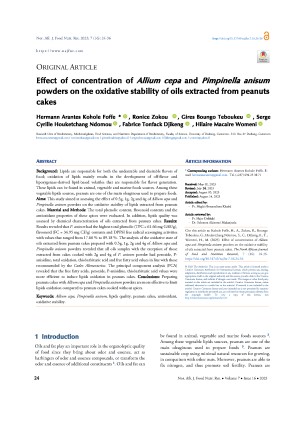Effect of concentration of Allium cepa and Pimpinella anisum powders on the oxidative stability of oils extracted from peanuts cakes
Abstract
Background: Lipids are responsible for both the undesirable and desirable flavors of food; oxidation of lipids mainly results in the development of off-flavor and lipoxygenase-derived lipid-based volatiles that are responsible for flavor generation. These lipids can be found in animal, vegetable and marine foods sources. Among these vegetable lipids sources, peanuts are one of the main oleaginous used to prepare foods. Aims: This study aimed at assessing the effect of 0.5g, 1g, 2g and 4g of Allium cepa and Pimpinella anisum powders on the oxidative stability of lipids extracted from peanuts cakes. Material and Methods: The total phenolic content, flavonoid contents and the antioxidant properties of these spices were evaluated. In addition, lipids quality was assessed by chemical characterization of oils extracted from peanuts cakes. Results: Results revealed that P. anisum had the highest total phenolic (TPC = 61.66 mg GAE/g), flavonoid (FC = 34.95 mg CE/g) contents and DPPH free radical scavenging activities with values that ranged from 17.66 % to 89.18 %. The analysis of the oxidative state of oils extracted from peanuts cakes prepared with 0.5g, 1g, 2g and 4g of Allium cepa and Pimpinella anisum powders revealed that all oils samples with the exception of those extracted from cakes cooked with 2g and 4g of P. anisum powder had peroxide, P-anisidine, total oxidation, thiobarbituric acid and free fatty acid values in line with those recommended by the Codex Alimentarius. The principal component analysis (PCA) revealed that the free fatty acids, peroxide, P-anisidine, thiobarbituric acid values were more efficient to induce lipids oxidation in peanuts cakes. Conclusions: Preparing peanuts cakes with Allium cepa and Pimpinella anisum powders are more effective to limit lipids oxidation compared to peanuts cakes cooked without spices.
Keywords: Allium cepa, Pimpinella anisum, lipids quality, peanuts cakes, antioxidant, oxidative stability.
Full text article
Authors
Copyright (c) 2023 Hermann Arantes Kohole Foffe, Ronice Zokou, Gires Boungo Teboukeu, Serge Cyrille Ndomou Houketchang, Fabrice Tonfack Djikeng, Hilaire Macaire Womeni

This work is licensed under a Creative Commons Attribution 4.0 International License.
-
Attribution — You must give appropriate credit, provide a link to the license, and indicate if changes were made. You may do so in any reasonable manner, but not in any way that suggests the licensor endorses you or your use.
-
No additional restrictions — You may not apply legal terms or technological measures that legally restrict others from doing anything the license permits.





